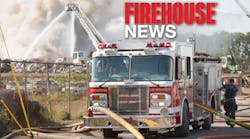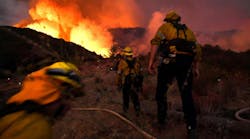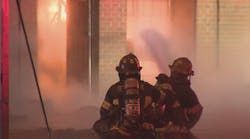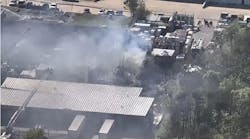May 2, 1898: JERSEY CITY, NJ - Fire broke out in a boarding house at 100 Grand St., trapping a 16-month-old girl and her nurse. Many of the guests of the boarding house were members of a troupe of actors performing nearby. Arriving firemen were advised of the trapped occupants and dashed into the blazing structure. The woman and the child were rescued but the child died from her injuries.
May 3, 1898: NEW YORK CITY - An early-afternoon fire on West 10th Street attracted a large crowd as firemen arrived and began their work. In the street Fireman J.J. Crawford of Engine Company 24 was helping to stretch a hoseline when on the third floor a man began to climb out of a smoke-filled window. With no truck company on the scene, Crawford dashed up the stairs and entered the smoke-filled apartment. Crawling along the floor, he came upon the 265-pound man just as he began to leap from the window. The fireman grabbed the victim and was almost pulled out the window with him but managed to hold him fast, then pull him back into the window to the delight of the cheering crowd below.
May 6, 1898: CLEVELAND - A six-story shoe factory on the corner of Bank and Lake streets was gutted by fire. Firemen slowed the advancing flames and controlled the fire before it spread to other buildings.
May 6, 1898: CINCINNATI - Firemen were at a serious disadvantage as flames raced through the top floors of a seven-story building. Struggling to get their hoses in position, the firemen were fighting a losing battle as the fire spread from one shoe company to another. Damage was more than $120,000.
May 8, 1898: CHICAGO - An emotionally disturbed man set fire to his apartment on Westlake Street after arguing with his wife. The dense smoke sent his neighbors fleeing as arriving firemen made quick work of the fire. The man was arrested at the scene by police.
May 8, 1898: DULUTH, MN - Fifty frame buildings on Minnesota Point, just above the ship canal, were destroyed by an afternoon fire. The district was populated by some of the city's poorest families. An hour after the blaze began, 2,000 people were homeless.
May 11, 1898: PHILADELPHIA - Three people were killed as a fire swept through the big six-story building on Market Street that housed the McCadden Brothers wholesale dealers in toys and fireworks. The fire was started in the cellar by exploding fireworks and spread quickly. Fire companies were faced with extending fire and fireworks rocketing out windows and doors. The flames spread to two other buildings but firemen were able to save both structures.
May 11, 1898: BALLARDVILLE, MA - A large three-story wool warehouse filled with flames just after noon in a fire accidentally started by roof repairmen. The Andover Fire Department responded on mutual aid but the fire extended to three buildings before it could be brought under control.
May 12, 1898: CHICAGO - A spontaneous-combustion fire destroyed more than 1 million bushels of grain and the elevator housing it. The flames spread from the Armour Elevator to a nearby lumber yard at 22nd and Morgan streets. The hard work of the firemen and a favorable wind kept the fire from extending to the vast lumber piles stored nearby.
May 18, 1898: ATTLEBORO, MA - An early-morning fire burned through 19 jewelry firms on Mill Street and threatened the entire business section before the flames could be brought under control. The total losses were estimated at $1 million.
May 20, 1898: TOLEDO, OH - Firemen battled a blaze in a wholesale grocery company and managed to prevent flames from extending to The Toledo Blade Publishing Co. next door. Losses were $350,000.
May 24, 1898: SAN LUIS OBISPO, CA - Shortly before 9 P.M., the fire department was called out for what was thought to be a brushfire along the banks of the creek behind a row of buildings on Higuera Street. By the time the firemen arrived, however, the flames had spread to a paint shop and were soon engulfing a long line of wooden structures. The firemen attempted to save a cigar factory but the walls and roof had already burned. Hose companies massed their strength and stopped the flames from spreading beyond an upholstering shop.
May 27, 1898: DALLAS - An afternoon fire spread through a two-story furniture warehouse and had extended into exposures on both sides before firemen arrived. Fanned by a brisk breeze the flames moved quickly and a general alarm was sounded. During the fire, the owner of one of the business entered the blazing structure to retrieve his books and ledgers when the building collapsed. Firemen rushed into the collapse area and rescued one other man before finding the business owner dead among the debris. A fireman was seriously injured by a secondary collapse.
TIME CAPSULE
California Theater Fire: San Francisco - May 1, 1898
It was the farewell performance of Madame Melba's season at San Francisco's California Theater, and the house was packed. The music had just started and the house settled down waiting for Madame Melba. Just prior to her entrance, a steam pipe burst beneath the stage, threatening the performance. The filled house sat patiently as workmen hurried to repair the pipes. The theater was filled with the sounds of hammering while the audience waited patiently to hear the renowned vocalist. Backstage the managers were pacing back and forth, nervously checking their watches.
Finally. the music resumed, however briefly. In the adjoining boiler room a fire broke out in the gas hot water heater, apparently unrelated to the steam pipe problem. Within moments, the flames had spread to Saint George Stables next door and the fire grew in intensity. People in the balcony were the first to notice the flames through the windows on the east side of the building.
Unaware of the fire and not sure of the reason for the commotion in the balcony, the majority of the audience below turned their attention from the stage and began watching the people in the balcony as they started to panic. Many below mistook the pandemonium above to be the result of a fight and stood up to get a better view. Disgusted patrons began yelling for them to sit as their view of the stage was blocked.
The fire was now raging through the stable next door and was producing a shower of embers and clouds of smoke that swept into the theater and the nearby California Hotel. The theater's manager finally stepped on stage and announced that there was no danger; that there was no need for panic but it would be best if everyone withdrew quickly.
With the panic already started in the balcony and smell of smoke in the air, patrons could not help themselves and became extremely agitated. Women shrieked and fainted, men struggled to lift the unconscious women and move them to safety. Mayor Phelan, who was in attendance, tried to calm the crowd and helped to divert the stream of humanity calmly to the exits.
Meanwhile, the fire department arrived and a chemical engine quickly extinguished the original fire in the boiler area and went to work on the now roaring stable. Back in the theater the mayor was helped by Policeman Heins, whose large voice and presence took command of the main exits and coolly directed the people outside. The theater was evacuated in short order with only minor injuries.
In the neighboring California Hotel the guests were hurrying outside as the smoke worked its way into the structure. Firemen were busy saving more than 30 horses from the stable as they battled the stubborn blaze. The fire was brought under control just as it was spreading to the theater's roof and balcony area. The firemen had done a superb job.
The inside of the theater was covered with expensive sealskin wraps and pocketbooks dropped by women and top hats and canes left behind by gentlemen fleeing the fire. None of the people in the theater and the hotel were seriously injured and none of the animals in the stable were lost. Considering the record of death and destruction America had suffered with fires in theaters, this one was a textbook operation.
Paul Hashagen
Compiled by Paul Hashagen




